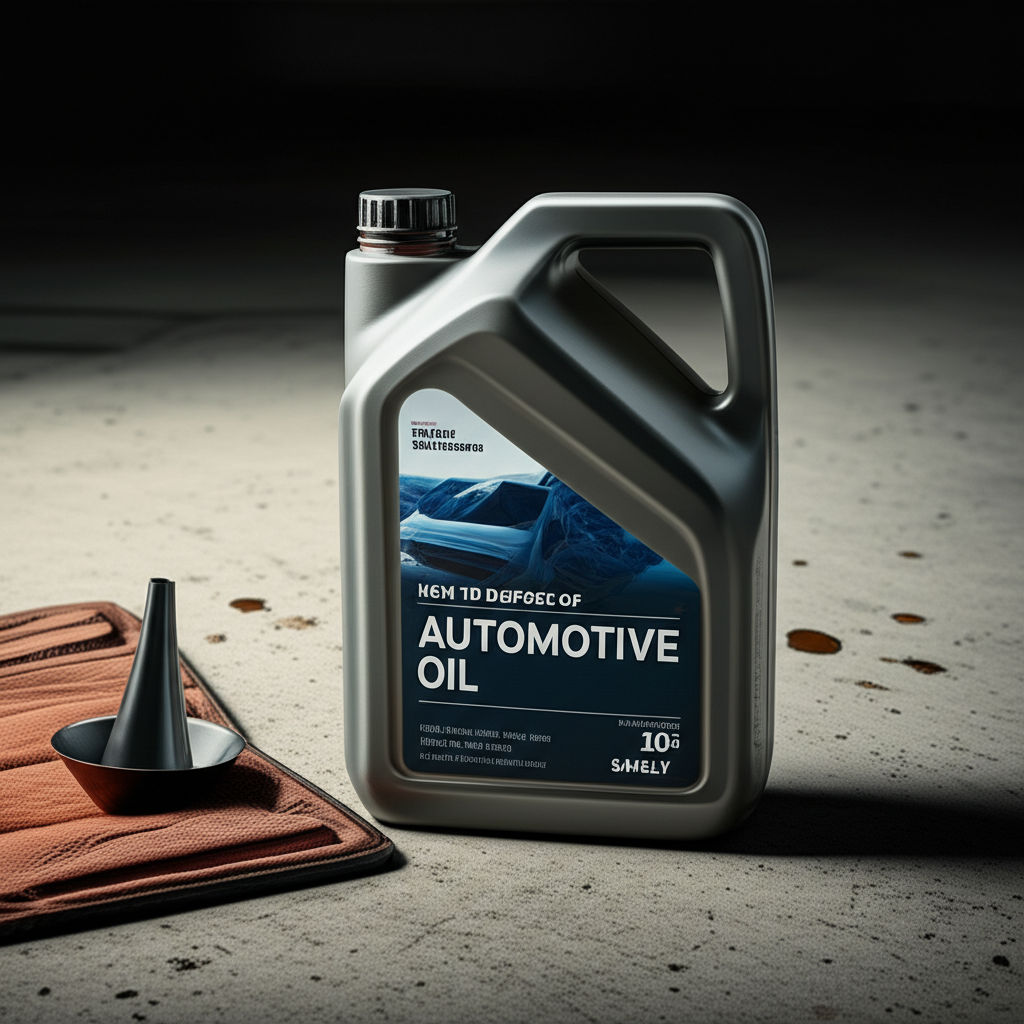How To Dispose Of Automotive Oil Safely
Ellie Moore

Photo: Don't dump it! Discover why safe automotive oil disposal is vital for the environment and how to recycle used motor oil properly.
Automotive oil, the lifeblood of your vehicle's engine, plays a crucial role in its smooth operation. But what happens to it once it's served its purpose and your car is due for an oil change? For many, the answer remains a mystery, often leading to improper disposal that carries significant environmental risks. Disposing of automotive oil safely isn't just a recommendation; it's a critical responsibility for every vehicle owner.
This comprehensive guide will demystify the process of how to dispose of automotive oil safely, providing you with actionable steps and essential knowledge. We'll explore why proper automotive oil disposal is paramount, the dangers of incorrect methods, and the simple yet impactful ways you can contribute to a healthier planet through safe oil disposal. Whether you're a seasoned DIY mechanic or just looking to understand responsible practices, this article will equip you with everything you need to know about recycling used motor oil.
Why Safe Automotive Oil Disposal is Not Optional
The dark, viscous fluid that keeps your engine running smoothly is far from harmless once it's used. As motor oil circulates, it collects contaminants like heavy metals, toxic chemicals, and dirt, transforming into a hazardous waste. Improperly discarding this used engine oil can have devastating, far-reaching consequences for our environment and even human health.
Environmental Impact: A Silent Threat
Imagine pouring a single gallon of used motor oil onto the ground. That seemingly small amount has the potential to pollute up to one million gallons of fresh water. This isn't an exaggeration; it's a stark reality. When oil seeps into the soil, it makes the land toxic to plants and microorganisms, reducing fertility and hindering growth. This can lead to long-term degradation of soil structure, making it unsuitable for future use.
The threat extends to our waterways. Oil dumped down drains or into natural water bodies forms a thin film on the surface, blocking sunlight and reducing oxygen levels vital for aquatic life. Fish and other marine organisms can suffocate, suffer from liver disorders, and experience reproductive issues. Birds coated in oil lose their insulation and buoyancy, leading to hypothermia or drowning. The entire aquatic food chain and ecosystem balance are disrupted.
Even the air we breathe isn't safe from improper automotive oil disposal. Burning used motor oil, especially without proper emission controls, releases harmful pollutants like volatile organic compounds (VOCs), polycyclic aromatic hydrocarbons (PAHs), and heavy metals into the atmosphere. These contribute to air pollution, smog, respiratory problems, and even acid rain. This also contributes to climate change by releasing greenhouse gases.
Legal Consequences: Don't Risk It
Beyond the environmental damage, improper oil disposal can lead to serious legal repercussions. Many regions have strict regulations against illegal dumping of hazardous waste, including used motor oil. Violators can face substantial fines, penalties, and even criminal charges. These laws are in place to protect public health and the environment, and ignorance is rarely an excuse. Taking the time to learn how to dispose of car oil correctly is not only ethical but also legally prudent.
The "Don'ts" of Automotive Oil Disposal: Common Mistakes to Avoid
Before delving into the correct methods, it's crucial to understand what you should never do with used engine oil. These common mistakes are highly damaging and illegal in most places.
- Don't Pour It Down the Drain or Sewer: This is perhaps the most dangerous misconception. Used oil can clog pipes, contaminate water treatment systems, and ultimately pollute local water supplies, harming aquatic life and potentially affecting drinking water.
- Don't Dump It on the Ground: As mentioned, oil seeps into the soil, rendering it infertile and toxic to plants and animals. This can contaminate groundwater, making it unsafe for consumption and irrigation.
- Don't Throw It in the Trash: Disposing of used motor oil with regular household garbage is illegal in many areas and contributes to landfill contamination, posing risks to soil and groundwater.
- Don't Burn It in Open Fires or Incinerators: Burning oil releases a cocktail of toxic pollutants into the air, contributing to smog and respiratory issues.
- Don't Mix It with Other Fluids: This is a critical point for oil recycling. Never combine used motor oil with other automotive fluids like antifreeze, brake fluid, transmission fluid, or even water. Mixing contaminates the oil, often making it impossible to recycle used motor oil and requiring it to be managed as a hazardous waste, which is much more costly and complex to dispose of.
The "Dos" of Safe Automotive Oil Disposal: A Step-by-Step Guide
Now that we've covered the pitfalls, let's focus on the correct and responsible way to handle your used automotive oil. The process is straightforward and accessible to everyone.
Step 1: Preparation is Key
Before you even begin draining the oil from your vehicle, set up your workspace. Lay down a tarp or plastic sheeting underneath your car to catch any spills. This simple step can prevent environmental contamination and save you a significant cleanup headache.
Step 2: Draining the Oil Properly
Use a dedicated oil drain pan, preferably one with a spout for easy pouring later. Position it directly underneath your engine's oil drain plug. Ensure the pan is large enough to hold all the oil from your vehicle. Once the oil has completely drained, replace the drain plug securely.
Step 3: Don't Forget the Oil Filter!
Your oil filter also contains residual oil and should be handled with care. After removing the filter, punch a small hole in its dome end and, if present,
Finance & Investment
View All
November 25, 2024
How Much Should You Really Save for Retirement? Here’s What Experts SayUncover the truth about retirement savings! Learn how much you should save based on expert advice. Discover factors to consider and strategies to reach your goals. Start planning today!
Ellie Moore

November 8, 2025
Capital One Auto Payment GuideBoost organic growth with expert SEO content. Discover how to create high-value, authoritative content that satisfies user intent and ranks on Google.
Ellie Moore

October 21, 2025
MTG Finance and Card Investing TipsUnlock your online potential with expert SEO content. Drive rankings, traffic, and trust by creating valuable, authoritative, and user-centric information.
Ellie Moore

November 25, 2024
Top Retirement Funds You Need to Know About in 2024Discover the top retirement funds to consider in 2024! Learn about different types of funds, their benefits, and how to choose the right ones for your retirement goals. Start investing for your future!
Ellie Moore

February 13, 2025
Industry Benchmarking for Small BusinessesDiscover how small businesses can leverage industry benchmarking to identify opportunities and stay competitive.
Ellie Moore

July 7, 2025
FHA Financing Options for BuyersUnlock digital visibility with expert SEO content. Learn how to rank higher, attract traffic, and build authority by satisfying both users and search engines.
Ellie Moore
Insurance
View AllStay safe with these tips to identify and avoid common insurance scams. Protect yourself from fraud and make informed decisions.
Ellie Moore
Decode your insurance policy! Learn to understand terms, coverage, and conditions with this beginner-friendly guide.
Ellie Moore
Learn how blockchain is enhancing transparency and security in modern insurance policies. Is your coverage future-ready?
Ellie Moore
Maximize your car accident claim! Discover why top-rated lawyers are essential for navigating complex insurance, securing optimal compensation & justice.
Ellie Moore
Follow this simple step-by-step guide to filing an insurance claim successfully. Avoid mistakes and get the coverage you need.
Ellie Moore
Enhance your coverage with insurance riders. Learn about their types, benefits, and why they’re crucial for customizing policies.
Ellie Moore
Education
View AllIs a college degree still worth it? Dive into a detailed analysis of the ROI on higher education, including costs, benefits, and future prospects.
Read MoreResearch universities play a key role in advancing knowledge. Explore how they drive innovation, discovery, and societal progress.
Read MoreIs self-directed learning the future? Learn how students can take control of their own education, boost motivation, and achieve better results.
Read MoreOutdoor learning promotes cognitive and social growth. Explore how nature-based education enhances learning outcomes and student well-being.
Read MoreOnline homeschooling communities are growing fast. Explore how they provide support, resources, and a sense of belonging to families worldwide.
Read MoreMicro-credentials are on the rise! Discover how they provide fast, focused skills for today’s learners and reshape education.
Read MorePopular Post 🔥
View All
1
2
3
4
5
6
7
8
9
10
Health






Automotive
View All
August 10, 2025
Rick Case Automotive Group Service Highlights
Rick Case Automotive Group redefines vehicle service. Unmatched expertise, customer focus, and value ensure your car gets the best care.

February 8, 2025
Ride-Sharing’s Impact on Car Ownership Explained
Discover how ride-sharing services are changing car ownership. Learn about the economic and environmental effects of this evolving trend.

September 5, 2025
Best Deals On Automotive Tint Near Me
Get the best deals on automotive tint near you! Enhance privacy, reduce heat & UV, and boost style with our comprehensive guide.

August 25, 2025
How To Dispose Of Automotive Oil Safely
Don't dump it! Discover why safe automotive oil disposal is vital for the environment and how to recycle used motor oil properly.

July 26, 2025
First Automotive Repairs And Maintenance Tips
Unlock confident car ownership! Our guide for new owners covers essential auto repairs & maintenance for safety, longevity, and savings.

July 16, 2025
Explore Exciting Cox Automotive Jobs Opportunities
Drive your career forward with Cox Automotive! Explore diverse job opportunities shaping the future of mobility through innovation and technology.

















